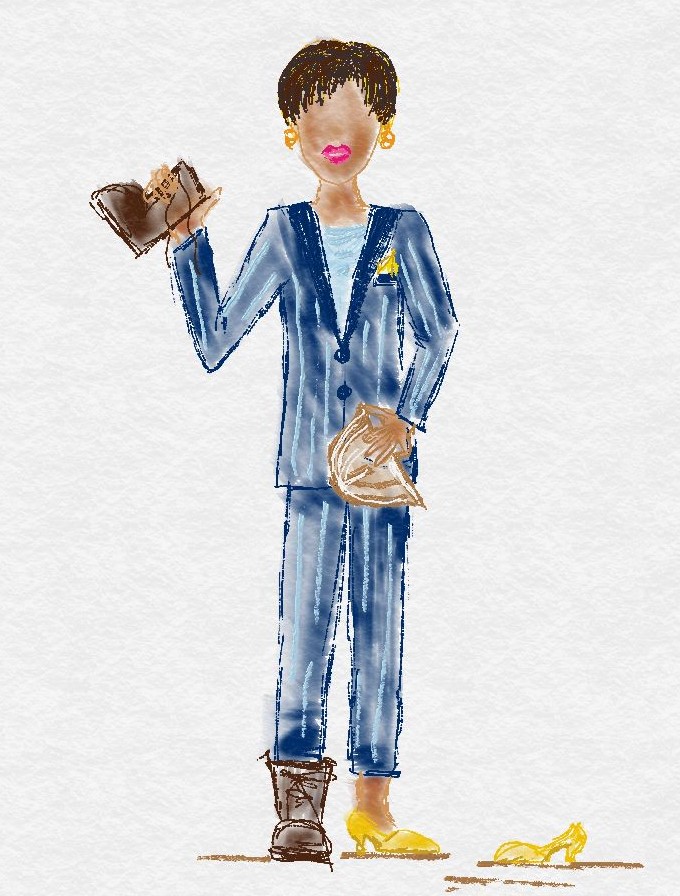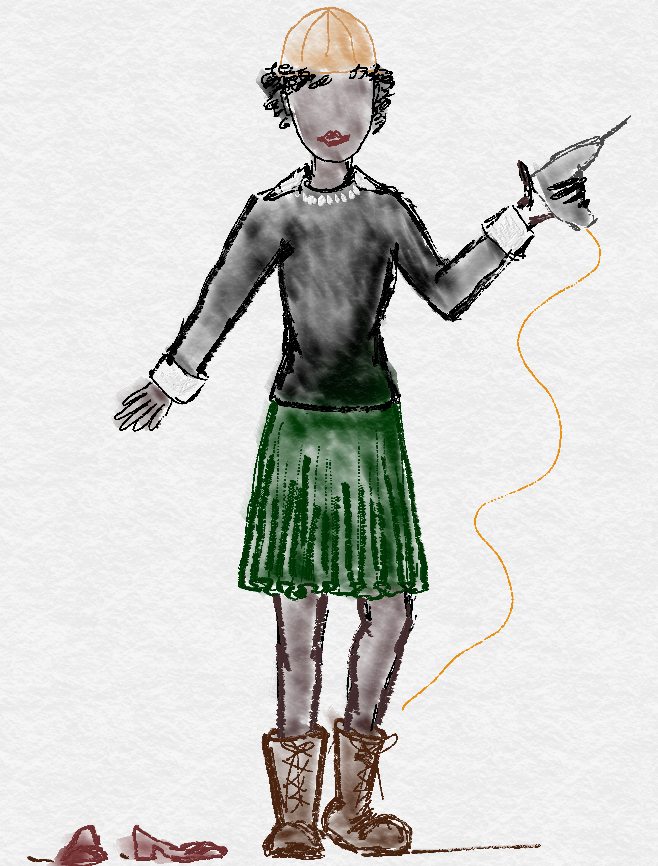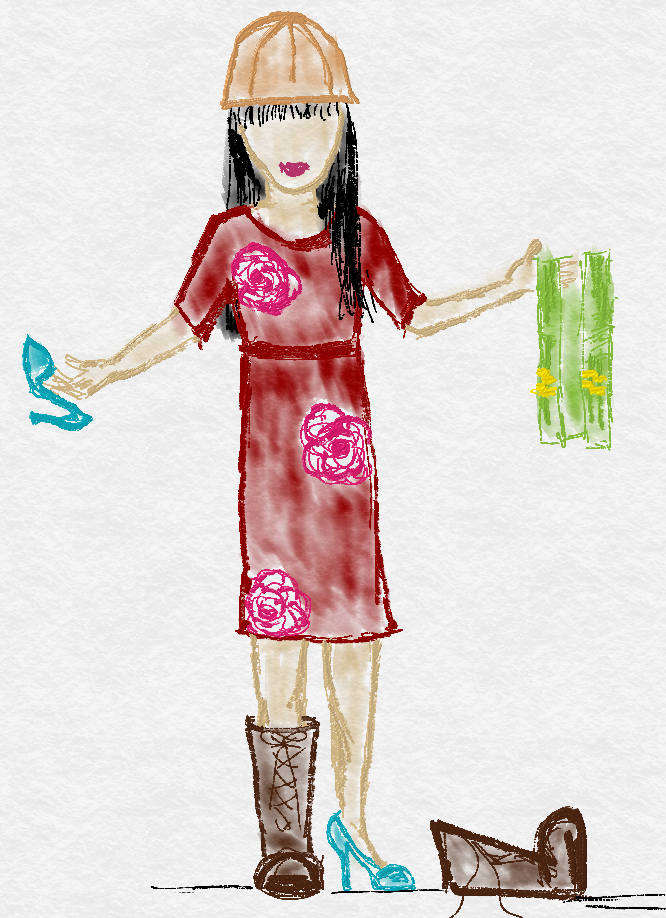sexism
A Head Start
Anger We Know, Pain We Don’t
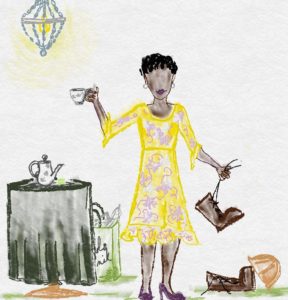
A few years ago, a friend talked me into online dating. I successfully had resisted getting sucked into this activity for a long time, not because I disapprove or think it doesn’t work, but because it is in direct opposition to what I need and want from a relationship. I hate being close-minded, though, so I caved.
The next month would have been comical if I didn’t have so little free time. There was the guy who admitted he had no friends and spent most of his time hating his ex. There was the guy who thought it would be “chill” to “hang” with me with his buddies because I knew the difference between a first down and a safety. There was also the guy who proposed on the second date and texted me for over eight months despite the fact that I never responded to a single message after telling him that I wasn’t the face inside a heart outline on the Hallmark card of his life.
I stopped responding to any of the would-be suitors, (particularly the guy who collected spiders), but was too busy to go through the arduous process of shutting down the account. One exhausting day, I was cleaning out the collection of e-mails I had gotten over the last week or so from the dating site, and one message caught my eye. The guy in the photo had a captain’s hat perched on his head at an angle. Sure enough, his profile identified him as living in a run-down area on the other side of the river where a motley collection of not-even-close-to-yachts were docked. His message read, “Hey – what are you doing tonight? Are you up to something or are you just sitting around bored with nothing to do? I can fix that.”
I was incensed. Not just repelled by someone to whom I wasn’t attracted, but furious in a way that was way out of proportion to a stupid little dating request. I’m not in the habit of looking down on people, even when it’s someone who is beyond not my type. And it wasn’t the first time a guy I didn’t particularly care about asked me out, because I’m old and I’ve met a lot of guys over the years.
My anger was deep and volatile, and it manifested itself into an outrage that even I wasn’t expecting. It wasn’t just the fact that I’ve never been bored in my life, and his invitation suggested I was uninteresting and couldn’t come up with something to do. My visceral and sustained reaction came from the fact that he assumed that because I was a woman, I needed him to get something done, even if that something was just having fun. My poor little life was incomplete and boring, but he, (a man), could fix that just because he was a man.
I was angry at this man for the same reason I’ve bristled every time an old guy on a jobsite was just sure that I wasn’t maintaining my vehicle properly just because I was female. “I’ll bet you don’t remember the last time you got your oil changed.” It should have been funny. Instead, the top of my head blew off, and I had to walk away. Every time.
I was angry at this man for the same reason I still can’t look at a certain neighbor who came into my front yard one day and tried to tell me how I should take care of drainage on my property. “I know you’re an engineer, but…” This man knows nothing about drainage, but in his mind he knows more than me because he’s a man. I couldn’t possibly handle my property if he weren’t there to give me his wisdom because I’m a woman and I live alone.
As much as I make light of this at cocktail parties and laugh at outrageous stories, I hate the feeling of being dismissed. I hate being underestimated. I hate knowing that a large sector of the population automatically thinks the list of things I can’t do is extensive and that my fluffy little brain is too flighty and delicate to understand the importance of tire pressure and transmission fluid.
I’ve thought a lot about my anger during the past few weeks. As much progress as women have made in the past 20 years, the guys in the jaunty captains’ hats are still out there. But as infuriating as it is to feel dismissed, no one has ever looked at me negatively because they thought I was dangerous. No one has ever decided that my presence could be detrimental to the moral and economic fiber of a community. I may have been asked in the past what man was going to guarantee my mortgage, but no one has ever eliminated me from consideration for living somewhere because I was undesirable.
There is a difference between being dismissed and being pushed out. Black Americans know all too well what it feels like to be pushed out. Despite my own anger, I can’t imagine what it feels like to be actively distrusted and treated as a hazard, a danger to “good people.” My life has never been in danger just because of how I look. I may be frustrated, but there is little chance I will be physically harmed just for showing up. I know what it is to be overlooked and underestimated, but I don’t know the heartbreak of being hated every day for how I was born. Black men are killed because small-minded people believe that their sad little lives will be more secure if they can direct their anger and frustrations at a physical target who history has shown society won’t defend. Tragically, black women are burdened with racist hatred AND every woman’s handicap of being dismissed. As exhausted as I often become when dealing with sexism, I do not know how black women get out of bed every day with such enormous weight on their shoulders. If I am furious, their anger must be enormous.
When I was running cross country in high school, one of my teammates and I were out training on the road one day. She happened to be black. A pickup truck suddenly screeched to a stop in front of us, and we were pelted with rocks and rotten fruit. The truck sped away as the driver screamed ugly names at us and the passenger unfurled a Confederate flag with the KKK logo in the middle.
I was livid, and my dad was even angrier when I got home that night. “You two need to run in the exact same place tomorrow to show them that their racism won’t win,” he said. We did. The Klan members didn’t show up again, and we celebrated what we thought of as a victory.
What I didn’t consider at the time was the fact that my friend might not have gotten off so easily if she hadn’t been with a white girl. That rebellious inclination to get right back out there might have been possible because there was a much lower chance that something serious would happen to me. The difference between a serious attack and some drama during our run was my white privilege. The difference between me deciding to go “make a stand” and being a person who has known to be careful her whole life for fear of actually being injured was my white privilege. I knew I had an advantage then, because my parents were anti-racists, even when such a thing was scarce. But it has taken a lot of mileage for me to truly understand the head start I was given in life just by being white. It’s not fair, and it’s an advantage no one should have.
Here at Underpinnings, the pursuit of equal treatment for women is just one branch of our overall quest for equal treatment for everyone. To seek equality just in terms of gender would be ludicrous for a person who truly believes in a fair and just society. As with any project, the first step is to determine the most imminent danger and address it accordingly. People being demeaned, degraded, and marginalized is an important problem. People being killed is a critical problem. I’m trying to do everything I can to take action where the problem is critical and do more internal evaluation where the situation is more subtle. I will never be black, so I will never fully understand the experience of being the subject of hate just because my skin is dark. But I do know what it feels like to be dismissed and overlooked just because of the way I was born, and I don’t like it. I don’t want anyone to feel this way or worse, and I think now is not the time to be divided by our supposed weaknesses but to be united by them. This is an ugly, complicated, messy problem, but that just means we have to work harder to fix it.
Sweet and Salty
For All Our Galentines
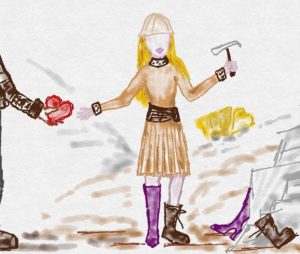
This is a week of treats, and we all like something salty and sweet, don’t we? So here is our offering to you for your morning or afternoon snack – or your midnight munchie. Something salty and something sweet.
Salty: The Spread
This morning was the fourth time in the past few months that I was subjected to what I have come to call The Spread. Sitting in my airline seat with my belongings tucked beneath the seat in front of me, I suddenly felt pressure on my right leg. I looked over and… there it was. The man in the seat next to me had settled into a comfortable position that included his legs forming a 90 degree angle, aka The Spread. About 25% of his leg mass had drifted into my seat space and was encroaching on my useable area.
I did what I normally do when this happened today – I ever so slightly pushed back, giving the guy a subtle “Hey, you’re in my space” nudge. But, as so often occurs, he was oblivious. I spent the rest of the thankfully short flight with even less room than current airplane seat measurements allow. By the time I got off the plane, I was irritated and resentful. The whole situation was even more puzzling when the guy turned out to be a very considerate gentleman when it came time to unload bags from the overhead compartments and disembark the plane.
I realize that this issue is but a small slight in the general realm of sexism, and I should be happy that I was on a plane because I have a job where I am unconstrained by sexist bosses and I get to travel to work for enlightened clients. On the other hand, the plane scenario, and its commonality in other places, feels a bit to me like a metaphor for women’s places in the world and the current state of our progress. There seem to be a number of guys who still want to stress that this is their world and they’ll encroach and make us uncomfortable if they want.
Certainly some of you are yelling at me right now, “Just tell him to move!” And yes, this also illustrates that not all of us are comfortable with just calling a guy out directly for his rude or sexist behavior. My southern sensibilities discourage it. My feeling is that it’s not a big enough deal and it will make the rest of the trip uncomfortable. What I actually would like to do would be to say, “Look – if you have a fungus and you’re uncomfortable, go get some medicine, but get out of my space!” But my sensitivity to other’s feelings tells me that maybe he doesn’t even know what he’s doing and perhaps he would be really embarrassed if I called him out directly.
‘And maybe that’s the real lesson here. Maybe he doesn’t realize what he’s doing. Of course, some percentage of the guys who Spread are completely aware of their actions, because there will always be jerks EVERYWHERE. But maybe some of these guys on planes and in stadiums are just like guys at work who interrupt us and push us out. Maybe their behavior was learned at an early age and they don’t realize its implications. So the proper response would be to clearly point out the issue, but without animosity. “Excuse me, would you mind moving your leg?” might be in the same league with “Could you work on not interrupting me during meetings?” If he responds badly, he’s a jerk being a jerk, not a good guy being clueless. And you can proceed accordingly. In fact, perhaps you can diplomatically educate the men in your life (husbands, fathers, brothers, sons, shoe salesmen) that to Spread is to be inconsiderate. Revolutionary behavior doesn’t always involve hostile confrontations, and sensitivity to other people being human often results in allies.
Sweet: Happy Valentine’s Week!
If you have been reading here for a while, you know that I am a perpetual optimist. On a crowded, noisy train I remind myself that some people never travel more than 5 miles from their homes. When my basement flooded, I said it was an opportunity to remodel. Other than the first week after football season is over, I can almost always find a way to summon a positive angle on a situation. It’s my survival mechanism.
As such, no one should be surprised that I love Valentine’s Day. Even absent a current Significant Other, I think it’s quite a fabulous holiday. The decorations are pretty, the movies on TV are sappy and hopeful, and every person has an opportunity to tell the people around her that she loves them.
Some among us are very cynical about the holiday, citing pressure on gifting, commercialism, and “It’s a made-up holiday”, as some of their reasons for being negative. (What holiday isn’t made up? Not even Jesus said, “Hey – make a really big deal about my birthday.”)
But I feel the opposite. I think this is a gift-wrapped chance to appreciate people, in case you’ve been too busy to do so. There is no law that says the person you are honoring is your sweetie. It could be your mom, your former teacher, your kids’ nanny – anyone! A positive sentiment is never a bad idea. And reminding yourself of all the good things in your life is a beneficial exercise whenever it may occur.
I have said something here before that bears repeating: Happiness is hard. Cynicism is easy. Negativity, skepticism, distrust, disbelief – all of these are conditions that some people would have you believe are the signs of intelligence. In fact, they are signs of fear. It is easier to be cranky and cynical and tell everyone that you didn’t ever expect to be treated equal to men in your job anyway, and all the men out there are malicious jerks. It’s hard to have hope. It’s brave to take the chance that your new boss really will support you in a male-dominated environment, and you’ll get to explore your career opportunities unfettered by the ignorance of others. Optimism and love are accompanied by the risk that your hopes will be dashed. But if the potential win is that you will realize your own goals and aspirations, or perhaps you’ll find happiness in another person, how can you afford to be negative and skeptical?
In the spirit of the season, I would like to say how much I care about all of my sisters in arms and everything you give me on a daily basis. I am constantly inspired and supported and encouraged by you, and you make my life a richer, more fulfilling existence.
I also appreciate all of the men who treat us as equals, fight for our progress, and don’t encroach on our figurative airline seats. I heart you guys, and I thank you for the daily dose of happiness you give me and others.
There will be crises and problems in our lives, but there also always will be goodness and love. I hope you can find some reason to be optimistic and grateful during the Valentine’s holiday. If you’re at a loss, message me and I’ll send you a list of shoe sales.
Perfection, Part II
Are These Our Only Two Choices?

No doubt you have taken part in at least one discussion, if not endless discourse, on the cultural rift we have today between our Millennial generation and the rest of the world in the working environment. Trust me when I say I understand why this division exists, because I have analyzed and investigated and listened until I can’t stand to hear the phrase “work-life balance” one more time. I get it, and I understand it. Whether or not I agree with many of the current recommendations for coping with it is a minefield for another time.
Pertinent to our exploration of perfection here at Underpinnings is a thread that runs through most examinations of why Millennials act the way they do – the idea that we, the parent generation, are at fault. As a friend of mine so aptly put it, “We always swore up and down that our kids wouldn’t have to work as hard as we have. Well, they don’t. At all.”
Before this turns into an ugly digital brawl over whether or not Millennials are worthless slackers or hapless victims, (do you love the fact that those are the only two choices?), I would divert your attention to the same hypothesis, but for a different issue. Are we, the parents of the next generation of brilliant women, promoting perfection at the expense of personal growth and societal improvement? And are we doing it to spare ourselves from pain?
Many of us in the GenX and Baby Boomer categories have fought some bloody battles to get where we are and to smooth the way for women behind us on the moving sidewalk of life. We remember when a woman would have very little recourse if a man on a construction site said something vulgar or, worse, didn’t pay any attention to her engineering recommendations. We’ve had our asses grabbed and our chests groped, and we have been on the receiving end of drunken kisses from superiors at professional events.
So things are better now, right? And that’s a good thing, right? But are we, ourselves, sabotaging more progress by reinforcing the notion of perfection in our daughters, our protégées, and our co-workers?
The connection between the quest for perfection and problems with sexism have played around the edges of my brain for a long time. There was something there that was truly bothering me, and I knew it was a very basic, very ugly problem. It took a lot of runs and hours on the Treadclimber to jar the pattern out of my observations. When I finally felt like I had made the connection I was sensing, it came down to two issues: stereotypes and sex.
Yes, we cheer on young women now in a variety of previously male-dominated fields. If you are the top of your class and you get promoted to district manager at 25 and you receive an award for Young Contractor of the Year, the world will give you a medal and call you legitimate. But if you are a female and you’re not in the top 10% of your class, chances are you will not get a rousing round of encouragement to “go for it.” Why? Because we all know that even in 2018, a woman has to excel to be considered average in a man’s world. A woman who does not excel will not be considered average, she’ll be viewed as dead weight. So, as often occurs, her loving family discourages her from moving forward in a career environment that they know will be difficult. Our message: If you’re not brilliant, you’re a failure. Even worse – if you’re not brilliant, you need to settle for being just a wife and mother. (As if being a wife and mother is easy or unimportant or settling). Why are there only two extremes? Because parents and mentors don’t want their loved ones to be hurt. So we drive drive drive the young ladies to get perfect grades and be class president and captain of the lacrosse team. And when our daughters get average grades and express interest in “unimportant” things like teaching or fashion or interior design, we write them off. (Where would we be without teachers???) Or when they get average grades and still want to be engineers, we discourage them. It will be too hard, we think. Being who they are isn’t enough to break the glass ceiling, so being who they are isn’t enough. We then relegate their career importance to whatever children they may someday have.
I work with a lot of men who aren’t very smart. (Insert jokes here). Many of them are successful because they work hard, they’re creative, and they come up with unique solutions to problems. There’s no reason to think that a female engineering student with middling grades couldn’t achieve in the same manner. But we know she’ll be underappreciated at the start, and we don’t want her to get discouraged. So we recommend different routes. We imply that anything less than perfection isn’t good enough to join our sisterhood.
The other side of this issue involves our personal, not professional, expectations of our younger generation. One could (try to) make the argument that some parents press their children of both sexes to be top notch academically and give up when they aren’t. But no argument can be made that we view our daughters and sons equally when evaluating their personal decisions.
Take pregnancy. Obviously, all parents and mentors want their young people to become parents when it is appropriate and feasible financially. (Spoiler – it’s never financially feasible to be a parent). But if a boy gets his girlfriend (or Friday night hookup) pregnant, chances are his family will be upset, but mainly concerned about how he’ll be able to support the child and how it will affect his future. If a girl gets pregnant by her boyfriend, her family is worried about the same things, but they are also ashamed. They are disappointed in her. As much as you can try to say that the concern is just about her future, 9 times out of 10 the parents and friends are disappointed in her moral choices. She let someone touch her. If the boy was a Friday night hookup instead of a boyfriend, the shame is tenfold. You can try to say all day long that all of the crying is about practicality and futures and finances, but you cannot deny the fact that many parents will look at their daughters differently in these situations. She had sex. Everyone will know. So they push their daughters to be perfect. Don’t dress improperly. Don’t flirt. You don’t need to pay attention to boys, you need to study. Isn’t it great that my daughter isn’t interested in boys?
A sad component of this problem is our own selfish worries about what others will think. “They’ll think I’m a bad parent.” “People will know my daughter decided to have sex and they’ll think less of me.” Needless to say, such concerns are shallow and only reinforce sexist societal attitudes.
Along with shame from pregnancy comes fear of our young women being seen as sexual beings at all. Our sons get lucky with a hot girl at work? At least one person will say, “Atta boy.” You find out your daughter had sex with a construction worker on one of her sites? Instead of, “Well, that wasn’t brilliant, but making mistakes means learning,” we say, “Who knows about it? Oh no. You’ll be ruined.” (No one EVER says, “Atta girl.”) In many cases, she will be ruined. Because we, the older generation, are freaking out about the fact that an adult woman in a free society made a choice. Again, you can say all day long that we are just trying to protect her, but perpetuating double-standards isn’t protection. It’s fear. We are limiting our daughters’ freedom because we are afraid they’ll get hurt, and that hurt will hurt us.
Our over-protection is just another version of trophies-for-everyone, no-grades-until-fourth-grade, and gifts-for-every-party-guest. Our generation and the generation before us got where we are by dealing with the ugly side of sexism in the workplace and in society. If we want progress to continue, we have to allow the current generation to participate. Let your young protégée take that job with that nasty old superintendent, and let her figure out how to show him who’s boss. She’ll probably make some mistakes, and she might even end up quitting the job, but at least she got out there. Support your daughter when she admits that she hates school and she’s always dreamed of being a magician on a cruise ship and VIEW HER CAREER AS VALID. Treat your niece like the shining star she still is when she comes home from Coachella pregnant. She is a smart, strong, ball-buster, and she’ll figure out a way to get her PhD in agronomy with a toddler on her hip. We have to stop telling our girls that their only two choices are perfection and mediocrity. And we need to respect them as the fierce individuals that they are instead of trying to cram them into some ideal that helps us sleep at night.
Civil Wars
The Casualties Are Higher When It’s Personal

It didn’t take the #metoo movement for most of us to be familiar with being undervalued or disrespected or ignored at work or in school. Even our youngest millennials who work in progressive companies with open-minded colleagues have run into ugliness at some point. The trouble may have come from a backwards guy on a jobsite spouting obscene suggestions while he ignored your engineering evaluation of the problem with his soil nail wall. You may have lost a promotion to a guy with less experience but who the boss felt more comfortable sending out to construction sites. Or the issue may have been more subtle; a manager who professed to care about your career but who kept assigning difficult projects to others in order to “give you less stress.”
As we wade through these swine-infested waters, the implication is that all of our problems are work issues. The offenders are people from families that aren’t yours. The misogynists are other women’s husbands (bless their hearts). And when you leave the offensive situation at work, you get to go home to sympathetic people who love you and value you for everything wonderful that you are.
Yes, in the candy-canes-and-teddy-bears world in my head this is true. We all have supportive, understanding partners and close-knit, warm families. Diane Keaton will be playing your mom in the movie about how you took on the unequal power structure at your company and won, and Kelly Clarkson will do the soundtrack.
How often is this really true? Using the analytical side of our personalities, does it make statistical sense that all of us fabulous women in our field would have enlightened partners and families? Not a chance. We have to be realistic about the fact that our career choices likely will make waves for us personally as well as professionally. And it’s doubtful that there’s an HR office in your house to sort it out. So solving your inequality problems with people you are tied to legally and genetically probably will be much more complicated than taking care of your work issues. And much more painful.
I worked with a woman years ago whose father was an earthwork contractor. He had raised his two sons to work in the family business, and neither had ended up working with him. On the other hand, his daughter had spent her childhood begging to learn how to operate a backhoe, asking questions about grade stakes and stockpiles. He told her that girls had no place in construction. She tried for years, only to be rebuffed. Finally out of high school, she chose to go to engineering school, hoping for a “backdoor” into her father’s world. Sadly, he never accepted her. His disapproval and lack of pride in his daughter’s accomplishments led to bitterness and anger in her. When I met her she was in her late twenties, and her bitterness toward her father subconsciously controlled most of her actions. She slept with men of whom she knew he would disapprove; she slanted all of her evaluations on jobsites against the interests of the contractors; and she measured every career victory in terms of what her father was missing. It was tragic.
Could she have changed her father’s longstanding opinions if she had tried a different approach? Could she have proven to him through actions that his outdated beliefs were wrong? We’ll never know. They stopped speaking to each other years ago.
Many counselors and psychologists will tell you that insecurities are magnified a thousand fold with your “family of origin.” This sensitivity can make rectifying a bad situation seem insurmountable. The emotions involved can cloud reason and douse any flame of energy for being patient with ingrained prejudices and longstanding beliefs. With family, a woman must have a true desire to change her relatives’ beliefs and behaviors. And she must have patience above all. Because she is not just redefining another person’s beliefs, she is restructuring the family unit. Making progress may not always be possible, and it will be arduous when it does occur.
A relationship with a partner is a completely different issue. A partner is someone who has been chosen. The implication is that the chosen person loves you and wants what’s best for you, no matter what. Even if such a person would have outdated beliefs, they would be easy to convert to a more progressive mindset because they think you’re fabulous.
If only it were that simple. As Annie Schmelzer said so brilliantly in this post, most guys don’t go around with a T-shirt that says they’re insecure sexists who will try to undermine you the minute they feel threatened. Wait – threatened? If you love a man and he loves you, why should he ever feel threatened? If you really love each other (and you didn’t get together just because all of your other friends were getting married and it was “time”), you both want nothing more than the health and happiness of the other person. Anything less isn’t real love. But close-but-no-cigar love often comes disguised as real love. Unfortunately, the voids usually don’t appear until it’s too complicated to just walk away.
My mistakes in this area have been spectacular, the product of my leap-before-I-look personality and my perpetual optimism. (Really? That alcoholic who flirts with me every time I come out on site doesn’t respect me? But he said he likes me…) My longtime boyfriend in college was very supportive of my engineering career until I ran into a problem with a guy on my second co-op job in school. When I told my boyfriend that I had brought it up to my boss, he said, “Hey – I didn’t sign up for any feminist crusade.” A guy had just been extremely disrespectful to me, and all my boyfriend could think about was not being involved in a conflict. And I was too stupid to get out of the relationship at the time.
Even though I broke up with that guy later, my obliviousness continued. Probably the most painful experience I had was when I got married to a man who professed to think that my job was “cool” and that he was proud of me. I had always thought that the best part of marriage was sharing yourself with another person, not being afraid that the other person will judge you or use what you share against you. Both of you are supposed to always be on the other’s side. But what I found is that every time I did well at work, my husband would use something I had told him against me. If I solved a dispute on a construction site, he would remind me that I had stomach ulcers and was “weak.” If I gained a new client, he would work into conversation that I get my rights and my lefts mixed up often. If someone else complimented me on my work at a party, he would tell the crowd that I told him how nervous I was when I had to deal with a particular client. I didn’t recognize the pattern – or the motive – at first, but as time went on his comments became meaner and his acknowledgements of anything I did well fewer and far between. Needless to say, he loved some idea of me, but not the actual me. Not the me who wades through mud in deep sinkholes. Not the me who changes her own tires and doesn’t automatically ask a man to perform tough jobs. And being with someone who didn’t want me to be the best person I could, whether as a muddy engineer or in a more traditional role, wasn’t healthy.
As difficult as our professional problems with gender inequality may be, solving the same problems in our personal lives is far more complicated and burdensome. The emotions involved can distort our perceptions of what is best for us and distract us from the truth in our lives. There is no handbook, no company policy, no legal recourse for being narrow-minded in a personal relationship. But we have our sisterhood in this, too, and we owe it to other women to support them when they need us, whether the problem is personal or professional. People we love and who allege to love us should love us for who we are, not who they want us to be. And just like in our professional lives, we owe it to ourselves not to settle for less.
